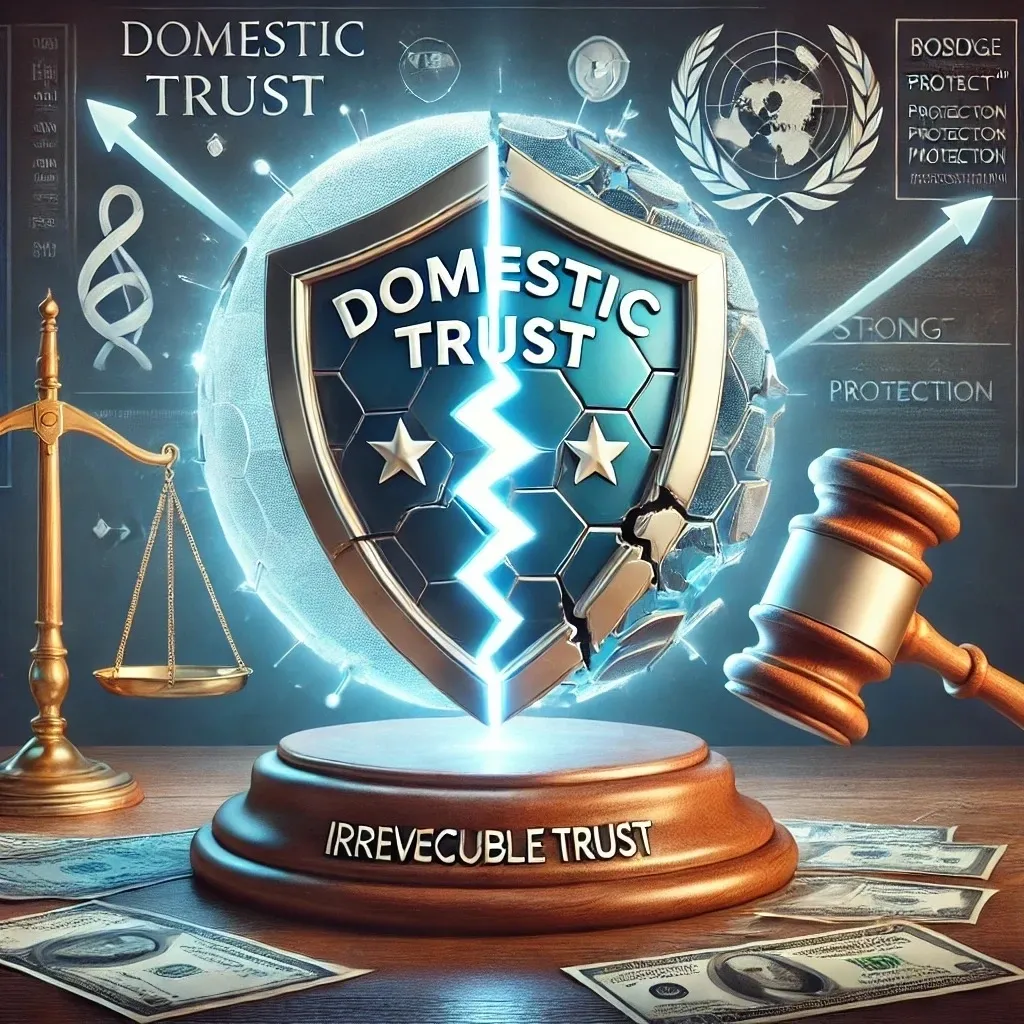In the early 2000s, domestic irrevocable trusts were widely marketed as the go-to solution for asset protection. Promoted as a way to shield assets from creditors, lawsuits, and financial risks while offering tax and estate planning benefits, they were once considered a more cost friendly alliterative to offshore trusts for financial security. However, over the past two decades, significant negative case law and statutory challenges have exposed their limitations.
Today, other solutions such as offshore trusts and The Bridge Trust® have continued to prove to be superior options, offering greater flexibility, simplicity, and stronger legal protection. This article dives into the pitfalls of domestic irrevocable trusts, particularly in states like California and New York, which lack self-settled spendthrift trust legislation and do not recognize asset protection trusts.
What Are Domestic Irrevocable Trusts?
A domestic irrevocable trust is a legal structure where a grantor transfers ownership of assets to a trustee, relinquishing control over the assets. The trust is designed to provide asset protection, shield assets from creditors, and facilitate estate planning and tax efficiency.
However, domestic irrevocable trusts often fall short in high-risk scenarios, as courts have repeatedly invalidated them due to fraudulent intent, excessive grantor control, or statutory limitations.
Why Domestic Irrevocable Trusts Are Not the Gold Standard
1. Substantial Negative Case Law
Numerous court rulings have revealed that domestic irrevocable trusts can fail to provide the promised protection. High-profile cases like Battley v. Mortensen (2011) and In re Huber (2013) have shown that these trusts are vulnerable when creditors challenge their validity.
2. Lack of Self-Settled Spendthrift Legislation
States like California and New York do not allow self-settled spendthrift trusts, which are trusts where the grantor is also a beneficiary. Without this legal protection, domestic irrevocable trusts are essentially defenseless against creditors in these jurisdictions.
3. Judicial Superpowers: Public Policy Overrules Statutes and Case Law
One of the most unpredictable and significant weaknesses of domestic irrevocable trusts is that judges often invoke public policy to pierce trusts, even when statutes and case law suggest otherwise.
• How It Works: Judges can override legal protections based on perceived fairness or public interest. This means a trust that technically complies with the law can still be invalidated if a judge believes it conflicts with societal or moral expectations.
4. Emergence of Better Solutions
Modern alternatives, such as The Bridge Trust®, address these weaknesses by combining the flexibility of a domestic trust with the robust protection of an offshore trust.
Key Limitations of Domestic Irrevocable Trusts
1. No Ownership or Control
Once assets are transferred into an irrevocable trust, the grantor permanently relinquishes control. While this is intended to protect assets, it often creates complications for families as financial or personal circumstances evolve.
2. Vulnerability to Fraudulent Transfer Claims
Domestic irrevocable trusts are frequently invalidated under fraudulent transfer laws, especially when created during financial distress or litigation.
• Uniform Voidable Transactions Act (UVTA): States like California and New York follow this law, making it easier for creditors to challenge transfers into a trust.
3. Excessive Grantor Control
If the grantor retains too much control over the trust, courts may treat the trust as an extension of the grantor’s personal assets, rendering it ineffective for asset protection.
4. Public Policy Overrides
Even when a domestic irrevocable trust complies with statutes and case law, courts can pierce the trust based on public policy considerations. This judicial discretion creates a significant vulnerability for grantors.
• Key Risks: Public policy overrides are often applied in cases involving child support, spousal maintenance, and unpaid taxes, where societal interests are deemed more important than the grantor’s intent to protect assets.
Case Law Highlighting Trust Vulnerabilities
1. Battley v. Mortensen (2011)
• Jurisdiction: Alaska
• Summary: A domestic asset protection trust was invalidated because it was created with the intent to defraud creditors.
• Lesson: Courts closely scrutinize the timing and intent behind trust creation.
2. In re Huber (2013)
• Jurisdiction: Washington
• Summary: A bankruptcy court pierced an irrevocable trust, ruling that it was established to hinder creditors.
• Lesson: Trusts created during financial uncertainty are particularly vulnerable to challenges.
3. Kilker v. Stillman (2012)
• Jurisdiction: California
• Summary: A trust was deemed invalid because the grantor maintained excessive control, effectively treating the trust as their alter ego.
• Lesson: Proper separation of control is critical for trust validity.
4. Toni 1 Trust v. Wacker (2018)
• Jurisdiction: Alaska
• Summary: The trust was invalidated due to non-compliance with state law, exposing assets to creditors.
• Lesson: Strict adherence to legal and procedural requirements is essential.
5. Dahl v. Dahl (2015)
• Jurisdiction: Utah
• Summary: The court included irrevocable trust assets in the marital estate during a divorce because the grantor retained too much control.
• Lesson: Retaining control over trust assets can expose them in divorce or litigation.
California and New York: High-Risk States for Trusts
California
• No Self-Settled Spendthrift Trusts: Under California Probate Code § 15304(a), creditors can access trust assets if the grantor is a beneficiary.
• Aggressive Enforcement of UVTA: California courts frequently rule in favor of creditors, especially when intent or timing raises concerns.
New York
• Strict Trust Laws: EPTL § 7-3.1 prohibits self-settled spendthrift trusts, leaving grantor-beneficiaries with little to no protection.
• Creditor-Friendly Courts: New York courts often invalidate trusts based on fraudulent transfer claims, public policy, or grantor control issues.
Better Alternatives: The Bridge Trust
Modern asset protection strategies, such as The Bridge Trust®, overcome the limitations of domestic irrevocable trusts by integrating the benefits of domestic and offshore protection.
Benefits of The Bridge Trust®
1. Retained Control: The grantor remains the beneficiary until a legal threat arises, offering unmatched flexibility.
2. Tax Simplicity: Functions as a grantor trust, eliminating the need for additional tax filings.
3. Offshore Protection: Assets transition to an offshore jurisdiction in the face of litigation, making them virtually inaccessible to creditors.
Conclusion: Modern Solutions for Modern Risks
Domestic irrevocable trusts, once a popular solution for asset protection, have proven ineffective for high-risk scenarios due to significant case law, statutory limitations, and judicial discretion based on public policy. States like California and New York, which lack self-settled spendthrift trust legislation, make these trusts especially vulnerable.
For those seeking reliable asset protection, modern solutions like The Bridge Trust® provide unparalleled flexibility and security. By combining the best features of domestic and offshore trusts, The Bridge Trust® offers a forward-thinking strategy for protecting your wealth in today’s litigious environment.
Contact us today to at (888) 773-9399 to talk with an asset protection attorney and explore how The Bridge Trust® can secure your assets and safeguard your financial legacy.
By: Brian T. Bradley, Esq.




